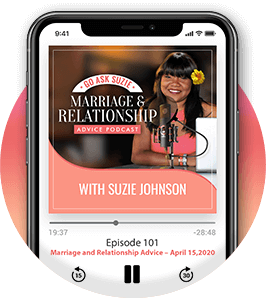If you’re dealing with betrayal, then you probably have many more questions than answers at this moment. And while this is totally understandable – it’s not a very comfortable place to be.
So, let’s help to alleviate some of that discomfort right now. In this article are my answers and insights to the seven most frequently asked questions I’ve gotten over the years from betrayed partners. You can use the menu below to jump directly to a particular question or read along at your own pace.
IN THIS ARTICLE YOU WILL FIND


Did I Do Something to Deserve This?
![]() I can’t seem to get over the recurring thoughts in my head: Did I do something to deserve this? Is it because there was something wrong with me, or was I lacking in some way? Did I travel too much? Is it because I’ve gained a few pounds? I feel like a failure and like he cheated on me because there’s something lacking in me. I don’t blame him. I blame myself. Can you help me understand why this happened to me?
I can’t seem to get over the recurring thoughts in my head: Did I do something to deserve this? Is it because there was something wrong with me, or was I lacking in some way? Did I travel too much? Is it because I’ve gained a few pounds? I feel like a failure and like he cheated on me because there’s something lacking in me. I don’t blame him. I blame myself. Can you help me understand why this happened to me?
![]() When it comes to infidelity, there’s only one answer to your question, “Did you do something to deserve this?” No! You didn’t. So now, my question to you is this: Do you believe this is true? Would you take my word for it? I would like to believe that you would; and yet, experience tells me that you probably won’t.
When it comes to infidelity, there’s only one answer to your question, “Did you do something to deserve this?” No! You didn’t. So now, my question to you is this: Do you believe this is true? Would you take my word for it? I would like to believe that you would; and yet, experience tells me that you probably won’t.
Have you ever heard of survivor’s guilt?
Just in case you haven’t, I’ll tell you what it means. Survivor’s guilt is an irrational type of emotion experienced by someone who’s been “spared” from some kind of trauma or survived a deadly event. For example, some people were late for work at the World Trade Center on the morning of September 11th; as a result, their lives were spared. Rather than feeling gratitude and relief, many ended up suffering for years from survivor’s guilt. Experts say this is largely based on the sense that they didn’t deserve to be spared.
I have noticed a similar kind of guilt when infidelity rocks a relationship.
Here’s what I mean: When infidelity is discovered, the partner who’s been betrayed often experiences a similar kind of irrational emotion. In this case, it’s a type of victim’s guilt. And it’s largely built on the sense that they did something to deserve it.
Here’s how the two compare:
- Survivor’s Guilt— When a person survives a traumatic event and then secretly fears they didn’t deserve to be spared.
- Victim’s Guilt— When a person survives a traumatic event and then secretly fears they deserved to be victimized.
Survivor’s Guilt
Victim’s Guilt
People secretly fear they did not deserve to be spared.
People secretly fear they did deserve to be victimized.
Can you see how both these types of guilt (and fears) are irrational?
I’m sure you can.
It’s important to notice how these are two sides of the same coin. If you can see how irrational it is for someone who’s been spared the trauma to feel guilty about being spared, then you can see how irrational it would be for someone who’s been victimized to feel guilty about being victimized.
Here’s another thing…
Just how survivor’s guilt is toxic to the recovery of the person who’s been spared, victim’s guilt is toxic to the recovery of the partner who’s been betrayed.
In fact, I will go out on a limb and say, “Victim’s guilt is one of the biggest mental traps to watch out for, after infidelity.” This is because if you’re not careful, it can hold you hostage to pain and suffering for a very long time.
More About Victim’s Guilt
What exactly is victim’s guilt?
It’s the irrational guilt brought on by the fear that when something bad happens, you might have done something to deserve it.
For example:
A betrayed husband is experiencing victim’s guilt when he wonders to himself…
“Did she cheat on me because I don’t make enough money? Did she cheat on me because I wasn’t paying enough attention to her? Did she cheat on me because I’m not good enough in bed?
A betrayed wife is experiencing victim’s guilt when she wonders to herself…
“Did he cheat on me because I gained weight after the baby? Did he cheat on me because I don’t do certain things in bed? Did he cheat on me because I didn’t pay enough attention to him?”
Another sign of victim’s guilt is when you believe that somewhere, somehow, you could have done something to prevent this from happening.
I caution you to stay vigilant and be on the outlook for this kind of thinking. Looking back on anything, it’s easy to fool yourself into thinking things Like… “I should have known! or “I should have seen this coming!” You get the point. But the truth is, you didn’t know. And that means you are innocent (not guilty).
Let me ask you something.
Do you believe each mentally healthy adult, is free to make his or her own choices? (I’m going to assume that your answer is yes).
Since people must make their own choices, neither you or I have the power (or the capacity) to make other people’s choices for them. So, it stands to reason that if you don’t have the power to make your partner’s choices, then you don’t have the power to unmake their choices either.
Here’s what it all boils down to.
Anyone’s decision to be faithful in a committed relationship is a personal choice. Think about it. Human beings are not hard-wired for monogamy. In fact, biologists have long understood that monogamy is rare in mammals. For example, of about 4,000 mammalian species, only a handful have ever been considered to be instinctually monogamous.
Like it or not, monogamy is a choice.
This means the decision to be unfaithful is also a choice.
And what is infidelity if not the decision to unmake the earlier decision to be faithful?
In other words, monogamy is an ongoing, day-by-day, moment-by-moment, personal choice.
Which brings us to an important question (one that just begs to be asked).
How could anyone feel responsible (and therefore guilty) for the choices another person makes or unmakes? You can’t.
So, keep this in mind.
Whenever your mind starts to wonder if it was because you weren’t perfect (or because things weren’t perfect in your marriage) that caused him to cheat… just remember this:
There are no good reasons for infidelity — only excuses.
Look. If someone is looking for an excuse to justify a wrong choice, they will always be able to find one.
So, I ask you…
Should you make yourself responsible for someone else’s willingness to be deceptive? (The obvious answer is no).
In order to move towards healing and recovery…
I want you to shift your thinking from blaming yourself to freeing yourself from unearned guilt. Because it would be a tragedy (as well as an impossibility) to make yourself responsible for someone else’s decisions.
Let’s recap… Both fidelity and infidelity are personal choices. And other people’s choices are not under your control. And what you can’t control, you can’t possibly feel guilty about. Make sense? Great.
So remember… You’re not alone, and you don’t have to stay stuck in darkness forever.


How could something like this happen to a good couple like us?
![]() Everyone said we were the perfect couple. As far as I knew, we didn’t have any major problems. We had a good sex life. We got along great. Our marriage wasn’t perfect, but it was going well (at least that’s what I thought). My husband is the last guy anyone would have imagined would ever do something like this. He used to counsel young men who were having marriage trouble. I remember how sorry I used to feel for the women that this kind of stuff happened to. I thought infidelity only happened in bad marriages. So how could it have happened in our good one?
Everyone said we were the perfect couple. As far as I knew, we didn’t have any major problems. We had a good sex life. We got along great. Our marriage wasn’t perfect, but it was going well (at least that’s what I thought). My husband is the last guy anyone would have imagined would ever do something like this. He used to counsel young men who were having marriage trouble. I remember how sorry I used to feel for the women that this kind of stuff happened to. I thought infidelity only happened in bad marriages. So how could it have happened in our good one?
![]() When a good man falls from grace, it’s like seeing an archangel fall from the sky. The incredibility of something like that would render the onlooker speechless.
When a good man falls from grace, it’s like seeing an archangel fall from the sky. The incredibility of something like that would render the onlooker speechless.
And now you want to know…
How could infidelity happen in a good marriage? Shouldn’t it only happen in bad marriages? How can a good man stray? Isn’t it only the bad ones that do something like that? All very good questions. Let’s take them one at a time, starting with this one:
Why good men stray.
Even saying the words… sounds contradictory, doesn’t it? Because if he’s a good man, doesn’t that automatically imply he won’t stray?
When we look at this more closely, here’s what I’ve discovered:
Somewhere along the way, we tend to confuse the word “good” with the word “perfect” and come to believe that they are synonymous. (I must admit, I’ve gotten these two confused in the past myself.)
 Reality Check
Reality Check
As just mentioned, there’s a difference between good and perfect. And there’s a difference between love and lust. Knowing these differences is key to understanding how something like this could have happened in your relationship and how it happens in countless others.

Let me explain.
What a good man is vs what a good man is not
- A good man isn’t a perfect man (there are no perfect men.)
- A good man is a mature man. He lives by a code, a standard of ethics.
- A good man is usually a man of integrity and a man that you can rely on.
- A good man is often a good friend, a good father, and generally an all-around good guy. And yet, he’s still not perfect.
A good man is a human man.
This means he’s subject to the same emotional push-and-pulls of life, just like any other man. In other words, a good man experiences the same insecurities, uncertainties, ambitions, and “desires to compete” that other men do. He has to deal with peer pressure, cultural expectations, financial pressures, and social pressures… just like other men do. And perhaps most importantly, because he’s a good guy, he’s often more vulnerable than other men.
Here’s a sobering observation:
After nearly two decades of doing this work, I’ve noticed that the majority of good men who stray didn’t go out looking for it. In fact, it’s not the woman they notice who represents the most danger. It’s the one woman who notices them.
Think about it this way…
A good guy spends the majority of his time trying to make the right decisions and do the right thing. This is part of what defines him as a good guy. These good decisions often go unnoticed and unrewarded.
(Sigh!) Such is the nature of being good.
Often, such a guy lives in a bubble. This isn’t something he’s unhappy about. He’s surrounded by love, warmth, home, and family life. In fact, nine times out of ten, he would describe himself as living a happy life.
So, what could possibly tempt a good man away from the warmth and security of the nest?
That’s a good question — possibly the most important one you could ask.

If there’s one thing we all seem to underestimate, it’s the power of our own sexual emotions. Let me explain. The human sexual emotional centers (lust, desire, arousal, urge) are primitive. They are hard-wired in the primordial brain. This means the urge and the desire for sexual connection, isn’t optional; it’s biological.
But that’s only one part of the story.
The other part is this: Once these sexual emotions are triggered if we’re not prepared to handle them, they can easily take us over. Why? Because that’s what they’re designed to do. Sexual emotions are designed to hijack your brain and distort logic.
 Remember: Mother Nature isn’t monogamous.
Remember: Mother Nature isn’t monogamous.
In fact, she’s pushing for variety, not exclusivity. Her agenda is simple: Procreate any way possible. This, of course, puts us in direct conflict with our ethics, social codes, religious training, and other principles. It’s an ongoing battle for nearly every man (and woman) in any monogamous relationship.
Here comes another twist.
The good guys (who by nature, are NOT players) usually have little experience handling these types of emotions. And sometimes, that naiveté makes them unwittingly more vulnerable to seduction.
Let me give you a real-world example.
![]() I recently worked with a client who described himself as the quintessential good guy. He’s the kind of guy who could go the bank and get a loan on the strength of his handshake. He had been married 15 years, never cheated, and (according to him), the thought had never even crossed his mind. And yet, one day, he found himself in a hotel room, pants on the floor, entangled in a heated kiss with a woman he had just met the night before.
I recently worked with a client who described himself as the quintessential good guy. He’s the kind of guy who could go the bank and get a loan on the strength of his handshake. He had been married 15 years, never cheated, and (according to him), the thought had never even crossed his mind. And yet, one day, he found himself in a hotel room, pants on the floor, entangled in a heated kiss with a woman he had just met the night before.
How did this happen?
How did a good man, go from faithful to unfaithful in the blink of an eye? Well, after we carefully reconstructed everything leading up to the event, here’s what we discovered: Long before the motel, his sexual emotions were triggered. His curiosity, lust, and desires were all stimulated to such a state that he literally lost control of his rational mind. Like a subject under hypnosis, he felt compelled to follow through on those urges.
So, what happened?
Why didn’t his logical mind kick in? Why didn’t the love for his wife and kids protect him? Why didn’t he stop and think? Again, it comes back to this: Human beings consistently underestimate the compulsion of sexual emotions, and yet these urges are at least as strong as the urge to eat. And so, he, like so many good men before him, naively (and arrogantly) assumed he could flirt with temptation and pull back at any time.
My client got a hard reality check. But unfortunately, it came a little too late.
He learned the hard way, that flirting with temptation is like playing with matches at a gas station. To assume that you can “fire off” these emotions and then control them is a sign of naiveté and arrogance (a lethal combination).
This is why I believe: no man is temptation-proof until he learns never to underestimate the power of his own sexual triggers.
![]() “No marriage is immune to infidelity — because marriages are made of people, and people are vulnerable to temptation.”
“No marriage is immune to infidelity — because marriages are made of people, and people are vulnerable to temptation.”
Just because you married a good guy doesn’t mean he’s perfect. In fact, his “goodness” can actually make him even more vulnerable to temptation than a so-called “player”. Maybe that sounds counter-intuitive but think about like this. Since he’s not looking for it, he may not see it coming. So, the question to ask yourself now is this: What can you do to infidelity-proof your marriage and help your man become more temptation-proof? Both of these are great questions.
My Suggestion? Consider enrolling in my Rebuilding Your Marriage Online Course for Couples. It’s the home-study version of the same step-by-step processes I personally developed (and have been using for 17+ years) to successfully guide my private clients back to love, trust and happiness after infidelity.
 Keep In Mind
Keep In Mind
The tools and strategies I teach in this online class are not from book theory. They come from me working with real couples just like you. Over the years I have cultivated a powerful “affair recovery tool kit”. After years of testing and tweaking, I only included everything in this course that works… and left out anything that failed to work.


Why didn't I see it coming?
![]() How come I was the last one to know my husband was fooling around? I feel like I’ve been played for a fool!
How come I was the last one to know my husband was fooling around? I feel like I’ve been played for a fool!
Did I just bury my head in the sand? Why didn’t I see it coming?
![]() Sadly, the signs of infidelity aren’t always as clear-cut as we’d like for them to be. This is why one of the most damaging things about infidelity is the unexpectedness of it. It is sort of like slamming into a glass wall you never knew was there. Rather than feeling like a fool, I believe it’s important to recognize how you were fooled (via deception, of course).
Sadly, the signs of infidelity aren’t always as clear-cut as we’d like for them to be. This is why one of the most damaging things about infidelity is the unexpectedness of it. It is sort of like slamming into a glass wall you never knew was there. Rather than feeling like a fool, I believe it’s important to recognize how you were fooled (via deception, of course).
Think about it.
If the tracks hadn’t been covered up, and if the facts hadn’t been misrepresented, if they hadn’t done what they needed to do in order to keep up appearances, you would have suspected something was up, right? This tells you that your lack of suspicion was not due to any lack of intelligence; it was because deliberate tactics had been used to block your awareness.
So, the answer to your question about why you never saw this coming is simple.” They used deceptive tactics to obscure your ability to see what was really going on. (More on these deceptive tactics later.)
For now, I want you to consider this:
How could you expect to find something that you’re not even looking for?
Trusting the person you love is not a sign of ignorance; it’s a sign of innocence. And I for one, will stand with the innocent every single time.
The innocent aren’t foolish, they aren’t weak, and they aren’t gullible. They are strong, they are trusting, and they are on the side of right. That makes them powerful. Never forget this. So, it’s important not to confuse your state of innocence with gullibility or weakness. They are not the same.

Never feel guilty about being innocent.
Never attach shame to not knowing. Under no circumstances should you ever blame yourself for someone else’s deceptions. To help you with this, here’s a crash course in what you’ve been dealing with.
A Crash Course in Deception
Deceptions are strategies used by those who want to make wrong choices and take wrong actions without paying a penalty.
The formula for deception is simple:
- Find ways to interfere with intelligent observation.
- Find ways to substitute a false (or fake) reality for a true one.
In other words…
Using deception is like using a blindfold to cover another person’s eyes so they can’t see what you’re up to. But in no way does that make the other person blind.
Hopefully, this helps you to better understand that whenever a person’s normal powers of observation have been tampered with, it’s not because of low intelligence; it’s a sign of interference. Deception doesn’t lower intelligence; it interfaces with it.

This can happen to anyone, at any time. I would even go so far as to say… there is no one alive that hasn’t had his or her intelligence tampered with through deception.
Here’s the kicker.
Deception as a long-term strategy never works. (And I mean never.) It’s always temporary, and it will always reverse itself.
How can I be so sure?
Here’s why: Because when you interfere with the laws of truth, you interfere with the laws of nature. And nature will not tolerate that kind of interference for very long.
Just look around and take note.
We don’t live in a random universe. You’ll notice how everything in the natural world works at a primordial level of precision. People are not excluded from this order. Therefore, wrong actions are never rewarded. It’s a fact: What is held in the dark, will eventually find its way to the light. And skeletons (no matter how deeply buried) eventually find their way out of the closet.
Another thing I’ve observed about deception.
The more clever the deception, the more stupid the discovery. You’d be shocked at the ingenious ways that “truth” is able to come to light (especially, when it comes to marital infidelity).
Busted! (happens in mysterious ways)
At this point – after hearing so many accounts of how people got busted… it’s starting to feel like I’ve heard it all; from small oversights like computers left open, emails and texts sent to the wrong person… to hidden cell phones ringing in suitcoats and suitcases… to concerned neighbors who anonymously tip-off the unsuspecting wife by leaving incriminating pictures in the mailbox… to seemingly random mistakes, like paternity tests mailed to the wrong house, flowers, and gifts delivered to the wife instead of the mistress… to hotels calling to do follow up surveys about a trip, the primary partner knew nothing about… all the way to what I consider to be the most startling way of them all: intuition.
Let me give you an example.
![]() A woman’s fiancé called her one day to let her know he was on his way to work. The call was so out of the blue that it provoked a sick sensation in her stomach. She thought “Why call to tell me he was on the way to work?” What happened next was something she’d never experienced before. She describes it as a strong flash of precognition. She saw in her mind’s eye where he was going, the name of the hotel, and the room number. The vision was so vivid that she was overcome with the urge to follow it through. So, she got in her car and drove more than 45 miles to the hotel she had seen in her vision. And lo and behold, right there in the parking lot, parked in front of the exact room number as in the vision, was her fiancé’s car.
A woman’s fiancé called her one day to let her know he was on his way to work. The call was so out of the blue that it provoked a sick sensation in her stomach. She thought “Why call to tell me he was on the way to work?” What happened next was something she’d never experienced before. She describes it as a strong flash of precognition. She saw in her mind’s eye where he was going, the name of the hotel, and the room number. The vision was so vivid that she was overcome with the urge to follow it through. So, she got in her car and drove more than 45 miles to the hotel she had seen in her vision. And lo and behold, right there in the parking lot, parked in front of the exact room number as in the vision, was her fiancé’s car.
Believe me when I tell you…
When he opened the door and saw it was her, he almost passed out!
The question is, how did she know? Where does this type of information come from?
This woman had no previous history of this kind of thing. Your guess is as good as mine. But it does point to the fact that the truth will find ways to come to the light. And deception is always temporary. This truth principle is often overlooked by those who use deception as a strategy. It’s never a matter of if the truth will come to light, it’s only a matter of when. Which brings us full circle.
Why didn’t you see it coming?
You didn’t see it coming because they used deception to prevent you from noticing. And as unfair as that might be – it’s not the end of the story. Because using deception, only gives the “illusion” of having an advantage. It never results in a person having a real victory.
And so, never fear being deceived – it’s always temporary. You can stand secure knowing that the dice of justice are always loaded on the side of the innocent.


How am I going to survive this?
![]() I feel like my world has completely fallen apart. I’m not sure what to do from one minute to the next. My thoughts are jumbled. I feel sick to my stomach. I feel like my life is changed forever, and it will never change back. I keep asking myself, how am I ever going to survive this?
I feel like my world has completely fallen apart. I’m not sure what to do from one minute to the next. My thoughts are jumbled. I feel sick to my stomach. I feel like my life is changed forever, and it will never change back. I keep asking myself, how am I ever going to survive this?
![]() Take a deep breath… hold it… and exhale. Let’s begin with one of the most important things for you to know right now, and it’s this:
Take a deep breath… hold it… and exhale. Let’s begin with one of the most important things for you to know right now, and it’s this:
No matter how isolated you might feel, and how deeply personal the pain goes, you’re not alone.
Right now, there are thousands who are going through the same kind of emotional turmoil you’ve been feeling. In fact, without even knowing where you live, I can tell you… you are not the only one.
- You’re not the only one on your block.
- You’re not the only one in your town.
- You’re not the only one in your city.
- You’re not the only one in your family.
- You’re not the only one in your circle of friends.
- You’re not the only one in your church, synagogue, gym, yoga class, school, country or company.
… and right now, you’re not the only one reading these words.

It’s vitally important that you realize and connect to this reality.
Intellectually, I’m sure you’re already aware that you’re not the only one dealing with the pain of infidelity. But just knowing that from an intellectual standpoint is not enough.
You must let yourself feel it so you can connect to others who are feeling it, too.
Why?
Why is it so important for you to know, feel, and connect to the understanding that your pain, rage, despair, shock, disappointment, frustration, and confusion are being shared right this minute by others just like you?
Key Healing Insight – It’s important because this type of connection triggers self-compassion. And compassion is going to play a vital role in your ability to rise above this crisis. Why is feeling self-compassion so important? It’s important because it opens the door to your healing process.
Here’s how it works:
As you connect to the understanding that others around the world are hurting just like you, this understanding opens your heart to feel a sense of compassion for them. These thoughts are like boomerangs. In the instant you feel compassion for others, you feel it for yourself.
For those in pain, self-compassion is the medicine most needed and yet least likely to be administered.
![]() Self-pity and self-compassion are not the same things. In fact, they are worlds apart, and yet, many people mistake them for each other.
Self-pity and self-compassion are not the same things. In fact, they are worlds apart, and yet, many people mistake them for each other.
Self-pity vs Self-compassion
Self-pity is a state of feeling sorry for yourself. It’s indulgent and based on the idea that you should’ve been the exception. This shouldn’t have happened to you. You were targeted and singled out. In other words, self-pity is motivated by playing the role of the victim.
Self-compassion, on the other hand, is a state of gentleness towards yourself. It’s motivated by the insight that you’re not the exception; you’re an example of what it means to be human. Rather than feeling singled out, you understand that pain is “par for the course.” No man, woman, or child is exempt (including you).
However, I do understand that sometimes, when you’re in a dark place, it’s hard to find a way to turn on the light. So, even if you don’t feel compassion for yourself right now… let’s test my theory and see if it’s helpful to feel it for someone else.
Are you willing to do that? (If you are, then I invite you to do the following).
We are going to take a moment and send a silent message of strength and compassion to another reader, who at this very moment is hurting just like you are?
Now… I want you to pause… right here… and imagine a warm glow of radiant light expanding out from your chest area and radiating in all directions out into the universe.
Now imagine… those waves of glowing white compassionate energy surrounding a stranger sitting alone at the computer screen reading and hurting just like you. Wrap your warmth around them like an invisible cloak lending your strength, good intentions, and loving support.
Let yourself feel this for a few minutes. Then, continue reading.
(If you did this exercise, I thank you.)
Always remember… as you give, you receive.
At the moment you sent that stranger your energy of love and support, a stranger sent YOU their energy of love and support. Isn’t it amazing how we don’t have to literally touch or talk to each other in order to support each other? I believe it truly is.
Speaking of love and support, in my opinion, those two things play a major part in helping you survive infidelity. Now, let’s go back to your question.
How do you survive infidelity?
I wish I could tell you there’s a magic pill you could take that would instantly restore things to the way they were before this happened — but I can’t. Surviving infidelity is a journey. There’s no quick fix. However, there are things that will get you through the process faster. Coming up next are four key things to help you fastrack your healing and recovery.

BEST Things to Get You Through the
Healing & Recovery Process Faster
 Be Gentle with Yourself
Be Gentle with Yourself
We’ve already looked at this a bit, but it’s important to remember that surviving grows from a state of compassion towards yourself. This means fully acknowledging the hurt, pain, and discomfort that you are in — rather than pretending, suppressing, or pushing it down. Self-compassion also means being willing to prioritize taking care of your needs first before taking care of other people’s wants.
Taking care of yourself includes:
- Being mindful of what you eat. Keeping up with your nutrition. (Stress drains energy and depletes nutrients.)
- Getting enough sleep. (Take extra naps when you can. Rest is super important for your recovery.)
- Continuing to exercise — even if it’s just walking. (Activity influences attitude.)
- Doing only what’s necessary. (Now is not the time to take on extra projects or bonus work.)
- Banish negative thoughts — don’t indulge them. (Obsessing is a failure loop.)
 Let It Be Okay That Things Aren’t 100% Okay Right Now
Let It Be Okay That Things Aren’t 100% Okay Right Now
It’s very important at a time like this to allow yourself to feel, to admit it hurts, to own your feelings and to acknowledge that things are not exactly normal right now.
This means you need to be willing to…
- Let it be OKAY for you NOT to be OKAY right now.
- Let it be OKAY for you NOT to know exactly what you want right now.
- Let it be OKAY for you NOT to feel normal right now.
Key healing Insight: Self-compassion is exactly the same thing as self-love. Giving yourself the love, support, and gentle thoughts, you need right now is exactly the right medicine to heal what’s hurting.
Caution: Self-torture is the opposite of self-compassion, and it does you no favors. It’s not helpful. It’s not useful. In fact, it’s harmful and totally unnecessary. Therefore, don’t indulge in it.
 Take It One Day at a Time
Take It One Day at a Time
One of the biggest threats facing you right now is getting overwhelmed. Trying to fast-forward and predict what’s going to happen in the future triggers anxiety. Trying to undo the past triggers frustration and resentment (since it can’t be done). So, the only real safety is to stay in the present moment as best you can and remember to take it one day at a time.
This means:
- Make today’s decisions for today only.
- Don’t attempt to predict the future or try to undo the past.
- If things get to be too much, scale it down to one hour, one minute or even one second at a time.
 Remember: The way to eat a 7-ton elephant is one bite at a time.
Remember: The way to eat a 7-ton elephant is one bite at a time.
It’s the same with surviving infidelity — you do it one day at a time. As you grow stronger, you recognize that this isn’t only the key to surviving infidelity; it’s the key to surviving any difficulty. Because as long as you keep your mind focused on the present, and make your decisions one day at a time, there’s nothing you can’t get through.
 Consider taking my Betrayed Recovery Master Class
Consider taking my Betrayed Recovery Master Class
My Betrayed Masterclass is the home-study version of the exact same processes I’ve personally developed (and have been using for over 17 years) to successfully guide hundreds of betrayed partners from
failing to coping; from pain to peace and from hurting to healing in the aftermath of betrayal.
And in my opinion…
There are very few resources available today, as effective in helping you not only survive, but overcome the hurt you didn’t deserve… with your pride and self-esteem intact. Sounds like a tall order? That’s because it is.


Why am I so obsessed with knowing the details?
![]() I can’t stop asking him about it. I want to know everything that happened (where they went, what they were wearing, what they said).
I can’t stop asking him about it. I want to know everything that happened (where they went, what they were wearing, what they said).
I can’t stop obsessing about the details. Is this normal?
![]() My answer: This is always a tricky question. The main problem is the idea of what is normal. So, let me just get it out of the way and say…
My answer: This is always a tricky question. The main problem is the idea of what is normal. So, let me just get it out of the way and say…
There’s no way for me to gauge normal.
I think what you’re asking me is whether or not it’s unusual for the betrayed partner to want to know the details of the affair. The answer to that question is no. It’s not unusual. In fact, it’s been my experience that partners who experience betrayal on any level want to know exactly what happened, with whom, where, and why.
However, a better question to ask might be, is it useful to know? Will uncovering each tiny scrap of sordid detail, help you recover faster or cope any better? Will knowing what she wore, what he wore, where they went, what they ate, what they said… make it easier for you to find closure? The answer to that question is yes… and… no.
Here’s what I mean:
When it comes to dealing with infidelity, you’ll find there are no black and white answers and no perfect solutions.
Every step is layered with complex emotions, and certain things will never be completely resolved to your satisfaction. That’s why it’s not so much about wanting or needing to know the details that create the biggest challenge. The real challenge depends on the why behind wanting to know the details. In other words, before you demand to know the details, ask yourself: What will you do with those details? Will you use the information to hurt yourself or to help yourself?
I believe it’s important to know your own motives for why you want to know because knowing the details could be helpful or it could be harmful — depending on how you use them.
Let me explain.
If you’re like most betrayed partners, your reason for needing to know all the details falls into one of the following categories:
- You want to know the details because you’re hoping that by being able to reconstruct the events accurately, you can analyze what happened, find what went wrong. And you hope to learn how to prevent it from happening again in the future.
- You want to know the details so you can use that information as a weapon either against yourself (self-torture) or against your partner (guilt).
- You want to know the details so you can compare what he did with her, versus what he does with you (in an effort to discover who got the better end of the deal).
(or some combination of the above)
With that said, take a moment to consider this:
If the main reason you want to know the details falls into category C — (because you want to compare the relationship you have with him against the relationship, he had with her) — then I must warn you to proceed with extreme caution.
Why?
Because affairs (by their very nature) are filled with lies, seduction, illusion, delusions, and misrepresentations.
Using the details of an affair as a measurement tool against a real relationship would be like using crime scene techniques you learned on a television show to investigate a crime in real life (your conclusions are going to be way off).
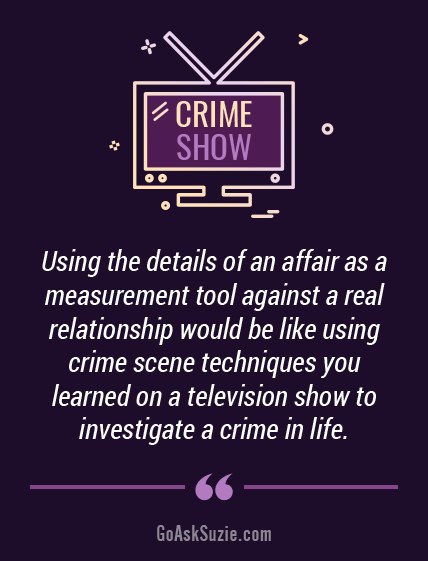
Here’s another thing to consider:
Can you handle the details? The truth behind the lies is often more painful and messier than most partners are prepared to deal with. Therefore, you must be sure that you’re able to handle it.

Know thyself, before you know the details.
Ask yourself…
Do you honestly believe you would be able to handle the details, the whole truth, and nothing but the truth, in a healthy way? Or (if you’re being honest) are you the type who’s more likely to use the sordid details to construct a self-torture movie that you can replay over and over in your mind? Or do you want the dirty tidbits to use as ammunition in a verbal campaign against your partner? (Be honest.)
Here’s the thing:
If you know deep down in your heart that you can’t handle the truth, or that you don’t have what it takes to process this type of information correctly, then I suggest you seriously question your motives before you pressure your partner for details. Because there’s no point in adding insult to injury or kicking the dog when it’s already down.
Are there times when knowing the details might be helpful?
That’s a good question. Before I share my ideas on this, here’s my fair warning.
 Fair Warning
Fair Warning
Many therapists, marriage counselors, and psychologists will absolutely disagree with what I’m about to tell you. In fact, most are of the school of thought that says… full disclosure does more harm than good.
If you’re seeing such a professional, I suggest you go with their advice. At no time should you ever substitute my general advice for the specific advice given to you by a medical professional. (I know that’s only common sense, but it’s an important reminder.)
Onward we go.
Pros and Cons of Full Disclosure After The Affair
I’m of the school of thought that full disclosure can be extremely useful. But, only if (1) it’s done in the right way; (2) it’s done for the right reasons; and (3) it’s only done after both parties have been properly prepared for it.
In my previous work with couples, I have often facilitated full disclosure sessions. However, I will only do this after I have spent time preparing both the betrayed partner and the wayward partner to feel safe to go to this level of honesty.
![]() Notice I used the word SAFE. It’s an obvious fact that where infidelity strikes, there are honesty issues. It’s my opinion that people will only be as honest as they feel safe to be. Therefore, a lot of my prep work is centered on creating safety first. This is why my full disclosure sessions include an immunity agreement.
Notice I used the word SAFE. It’s an obvious fact that where infidelity strikes, there are honesty issues. It’s my opinion that people will only be as honest as they feel safe to be. Therefore, a lot of my prep work is centered on creating safety first. This is why my full disclosure sessions include an immunity agreement.
More about immunity agreements
Before agreeing to full disclosure, both partners MUST agree to give immunity. Immunity is a method of pre-forgiving whatever is disclosed. Since it’s all in the past anyway, this allows both partners to be willing to be open to a higher level of honesty.
Why is an immunity agreement important?
For three reasons:
- The wayward partner will be more honest because now, it’s safe to be.
- The wayward partner is assured that he or she is not walking into an ambush.
- The betrayed partner is freed to handle the truth better and to process the details correctly in the right context (the past).
What happens during a full disclosure session?
We carefully reconstruct the details. In some cases, lots of new details come to light; in other cases, nothing new emerges.
Here’s the paradox:
Even when a betrayed partner has been prepared adequately to hear the truth… it still hurts to hear it. And even when a wayward partner has been reassured adequately that it’s safe, to tell the truth… some still lie.
Which brings us back to the point I made earlier.
When it comes to handling infidelity, there are no perfect solutions. And there will always be some things that never resolve themselves to your satisfaction.
It’s important that you know:
- You don’t need a perfect resolution in order to experience true recovery.
- You don’t need all the loose ends tied into a neat little bow in order to achieve closure.
- And you don’t need to know all of the details in order to move on.
That’s because infidelity isn’t a puzzle you have to solve. It’s more of a predicament you need to get out of, as soon as possible.
This is good really news!
Because it tells you that recovery is a choice. It awaits your decision. It does not await the details.


Isn't this the ultimate unforgivable act?
![]() I always told myself that if a man ever cheated on me, I would drop him flat. For me, it’s always been a deal-breaker. How can I forgive something so unforgivable? I gave him everything. And in return, he betrayed me. How can I be expected to forgive this?
I always told myself that if a man ever cheated on me, I would drop him flat. For me, it’s always been a deal-breaker. How can I forgive something so unforgivable? I gave him everything. And in return, he betrayed me. How can I be expected to forgive this?
![]() Given the circumstances, those are all fair questions. You only need a minimum amount of common sense to know that cheating of any kind is a mistake. Even a kindergartner knows this! So, why is it that so many smart and intelligent adults still make the choice to cheat?
Given the circumstances, those are all fair questions. You only need a minimum amount of common sense to know that cheating of any kind is a mistake. Even a kindergartner knows this! So, why is it that so many smart and intelligent adults still make the choice to cheat?
That, my friend, is an age-old question. But it’s a question that doesn’t just apply to people who cheat. It also applies to a lot of other very smart people. People who, despite knowing better, don’t always do better.
Many examples of smart people – making poor choices
- Lawyers who drive intoxicated. Every year, lawyers who specialize in D.U.I. cases… get arrested for drinking and driving.
- Doctors who smoke. There are still thousands of doctors who are overweight, out of shape and smoke cigarettes.3. Preachers visiting fallen angels. Evangelical preachers get busted visiting prostitutes.
What’s going on here? As you said, they all should know better. So why don’t they do better?
Well, when you look at the reality of what people do, versus what they know, it’s obvious there’s a pretty big gap between knowing and doing.
Let me tell you…
I have certainly fallen into that gap more than a time or two myself. I can think of countless times when I procrastinated on important tasks, even though I knew it would come back to bite me later on. And I can think of many times when I made the dumb choice when I knew what the smart one was.
Why is it that although we know better, we don’t always do better?
Sadly, I’m not sure there’s a definitive answer to that question. However, here’s something I’ve observed. When it comes to infidelity, a person’s level of emotional maturity seems to play an important role.
Emotional Maturity vs Emotional Immaturity
What is emotional maturity?
Here’s the definition I like the best: Emotional maturity is the ability to tell the difference between the things that are meaningful, from those things that are meaningless.
What is emotional immaturity?
Emotional immaturity is the inability to tell the difference between things that are meaningful, from things that are meaningless. This tells you… those who are emotionally mature are able to keep their priorities (values) in the right order. And those who are immature are unable to keep their priorities (values) in the right order.
Here’s the quandary:
Emotional maturity comes from the fruits of experience. BUT, experience is usually the fruit of immature mistakes! Maybe you’re wondering: How does emotional immaturity relate to infidelity?
Let me explain.
We all have a value system, a way of ranking what’s important, and in what order. The order we rank our values has a huge impact on our choices and behavior (much more than knowledge does). To help you understand this idea better, let’s take a look at four common values and how two different people might rank them.
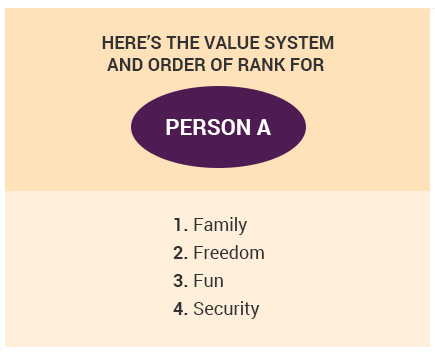
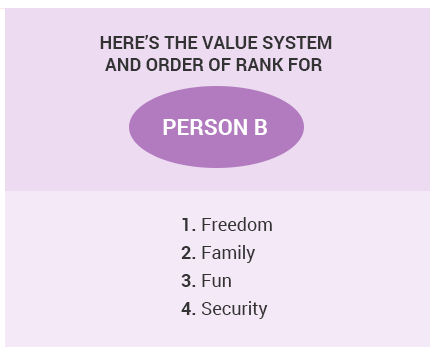
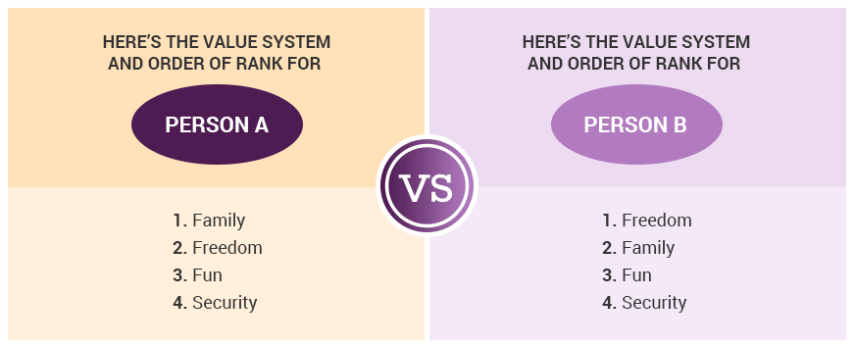
![]() Notice that both people have the exact same values. (Family, Fun, Freedom, Security) And yet, they didn’t rank them in the same order.
Notice that both people have the exact same values. (Family, Fun, Freedom, Security) And yet, they didn’t rank them in the same order.
For Person #1: Family ranks above Freedom.
For Person #2: Freedom ranks higher than Family.
Now, the question becomes: Of these two people, who is more likely to cheat? If you said Person #2 (the person who ranks freedom above family), I would tend to agree with you.
Here’s the thing about emotional immaturity: Because those who are emotionally immature are unable to see the difference between what is truly meaningful and what is meaningless, they’re more likely to rank meaningless things higher than meaningful things.
Let’s take the classic example of this.
Do you know the song “I Did It My Way” by Elvis Presley?
It has some very seductive lyrics. It seems to convey power, independence, status, and that rugged American self-reliance, all rolled into one.
Taken at face value, this becomes extremely dangerous, because as we all know, doing it “my way” doesn’t automatically mean doing it the “right way.”
So, placing a higher priority on “my way” over the “right way” often gets people in trouble.

Here are some more classic examples of misplaced priorities:
- Drug users often place a higher priority on Fun over Safety.
- Smokers often place a higher value on Being Comfortable over Being Healthy.
- Alcoholics often place a higher priority on Numbness over Feelings.
Wayward partners often place a higher value on Short-term Pleasure over Long-term Happiness.
What do these people (in the moments they make these decisions) and your partner have in common?
The answer is that they’ve all demonstrated misplaced values in some areas of their lives. In other words, they all have a certain degree of emotional immaturity. Which brings us to the second part of your question.
Isn’t infidelity the ultimate unforgivable act?
For many, it appears to be so. However, that doesn’t hold true in my book.
Before I tell you why I believe it’s important for you to recognize that forgiving is not the same as condoning. True forgiveness doesn’t ignore anger or consequences; it meets them head-on.
To understand why I believe infidelity is not the ultimate unforgivable act, let’s go back to our earlier definition of emotional maturity. It’s the ability to distinguish between things that are meaningful (worthy of time, attention, and resources) from the things that are meaningless (not worthy of time, attention, and resources).
Now ask yourself this question:
Between forgiveness and unforgiveness, on which do you place a higher value? This is an important question because your answer reveals which side of the maturity coin you currently fall.
Here’s the thing: The ability to forgive is a sign of emotional maturity, and the unwillingness (inability) to forgive is a sign of immaturity.
In other words… the emotionally immature cannot forgive. Why? Because they rank negative emotions (hate, revenge, contempt, punishment, retaliation) higher than positive emotions (peace, faith, love, compassion).
However…
If we had our priorities in the right order all the time, no mistakes would ever be made. Yet, we all make mistakes. Which tells you, we ALL have moments of confusion (times when we misplace our priorities).
Here’s another thing to consider: If you condemn your partner’s infidelity as being unforgivable, ask yourself, how many of your own foolish choices, misplaced values, mistakes, and moments of immaturity would you want to be written off as ultimate unforgivable acts?
One thing about True Forgiveness is there is no hierarchy. There’s no pecking order… no rank and file. Forgiveness, like love itself, is unconditional. There are NO exceptions. There are NO exclusions. Your mistakes are NOT excluded (and neither are his).
Now, for the final part of your question.
Is Infidelity a Deal-Breaker?
My answer: Yes, it is.
Why? Because infidelity invalidates your marriage vows (a promise to stay faithful), it voids the exclusive commitment, and it ruins trust.
However, just because it’s a deal-breaker doesn’t mean it’s unforgivable. The two aren’t the same, so let’s not confuse them. Regardless of whether the relationship survives or not, you will still have to forgive… in order to recover.
A deal-breaker is NOT unforgivable.
This is an important insight.
Vows can be renewed… relationship rules can be renegotiated… marriages can be rebuilt… love can be born again. In other words, although infidelity is a deal-breaker, it also presents an opportunity for a new deal.
If you wanted to, you could use what you have learned from this experience to renegotiate, improve, enrich, and rebuild a better relationship. (If you are curious about how other couples have done this you can read more about my re-commitment retreats here.
Or, you can simply walk away. The choice is up to you.
Know this: Regardless of which road you take — rebuild or walk away — forgiveness is absolutely necessary.


Why have I lost all desire to make love?
![]() Every time I see his hands, all I can think of is that he used them to touch another woman. Every time he tries to kiss me, all I can think of is that he used those lips to kiss another woman. And because of this, I seem to have lost all my desire to make love. What should I do to get it back?
Every time I see his hands, all I can think of is that he used them to touch another woman. Every time he tries to kiss me, all I can think of is that he used those lips to kiss another woman. And because of this, I seem to have lost all my desire to make love. What should I do to get it back?
![]() Loss of sexual desire after infidelity is actually a pretty common experience for women. Why? Because, for most women, trust is the ultimate aphrodisiac. So, chances are, it’s not so much that you have lost your libido as that you’ve lost that feeling of trust and security you need in order to experience true arousal.
Loss of sexual desire after infidelity is actually a pretty common experience for women. Why? Because, for most women, trust is the ultimate aphrodisiac. So, chances are, it’s not so much that you have lost your libido as that you’ve lost that feeling of trust and security you need in order to experience true arousal.
In other words, your partner has lost his number #1 sex appeal: Trust.
Here’s the interesting thing: When I explain to men that “trust” is the ultimate female aphrodisiac, they often look at me somewhat confused.
They will say to me things like, “I thought size, technique, and stamina mattered in the bedroom to women.” I have to shake my head and tell them. For women, emotions are the key that unlocks the gates of heaven. You arouse the right emotions, and you unlock the gates to paradise.
But that’s a two-edged sword.
Because on the other hand, if you arouse the wrong emotions — like doubt, mistrust, or boredom — then the gates of heaven will remain firmly closed to you. And maybe that’s why so far there’s been no Viagra for women. I believe it’s because trust cannot be packaged into a pill.
Why is there no Viagra for women?

Because trust can’t be packaged in a pill!
So how do you regain that loving feeling after infidelity?
That’s a very good question. My answer is this: When you restore the trust, your desire will soon follow. As you think about that, here are three things to keep in mind:
3 things you should know about trust and intimacy after infidelity
- Trust without forgiveness is impossible. Until you forgive his mistakes, you will not be able to see past them. The act of forgiveness is what allows you to see him in a whole new light.
- Trust is a gift. He cannot earn it. You must decide to give him your trust (or not to). Waiting around for him to prove he’s worthy or to try and earn back your trust can keep you in limbo for a very long time.
- What happens outside the bedroom affects what happens in it. If you’re fighting, hating, and blaming outside the bedroom, then that’s going to influence what goes on inside your bedroom. I suggest you first work on restoring peace in your home (and in your mind), then passion will start to return all on its own.
Do’s & Don’ts Around Sex, Trust, & Intimacy After Infidelity
![]()
Don’t use sex for punishment or reward. Using sex as a weapon of punishment, or to gain leverage, or as a bargaining chip, reduces a relationship to a transactional level. Rather than bonding the couple, sex becomes a competition in which one has the prize and the other is trying to get it.
![]()
Do think of sex as another one of the tools for re-connection that is available to you. If you’re not yet ready to reconnect sexually, that’s okay. Just be sure to find other ways to reconnect.
![]()
Don’t take on unearned guilt. A big mistake women make is believing that somehow, the affair was their fault. (If they were prettier, thinner, more accommodating, better cooks, or more attentive, he wouldn’t have cheated). Sadly, this is simply not true.
![]()
Do remember that the choice to cheat is always an individual choice. (It couldn’t have been democratic because you didn’t get a vote.) Therefore, take no responsibility for his poor choices.
![]()
Don’t compete with the other woman in your mind. Jealousy is the act of competing with others in your mind and seeing yourself as the loser. It’s really a form of self-torture.
![]()
Do always see yourself winning in your own imagination. This builds confidence and increases self-esteem.
![]() Rekindling sexual intimacy after infidelity is a process of doing the right things and doing them in the right order. It’s kind of like dialing a phone number. Not only will you need the right numbers, but you will also need to dial them in the correct sequence.
Rekindling sexual intimacy after infidelity is a process of doing the right things and doing them in the right order. It’s kind of like dialing a phone number. Not only will you need the right numbers, but you will also need to dial them in the correct sequence.
If you’re really ready to rekindle the love, sex, and intimacy in your bedroom, then the best place to start is with forgiveness… followed by trust. Doing these will help you naturally open the doorway to desire.
Until we speak again…
Remember… Love Wins!






